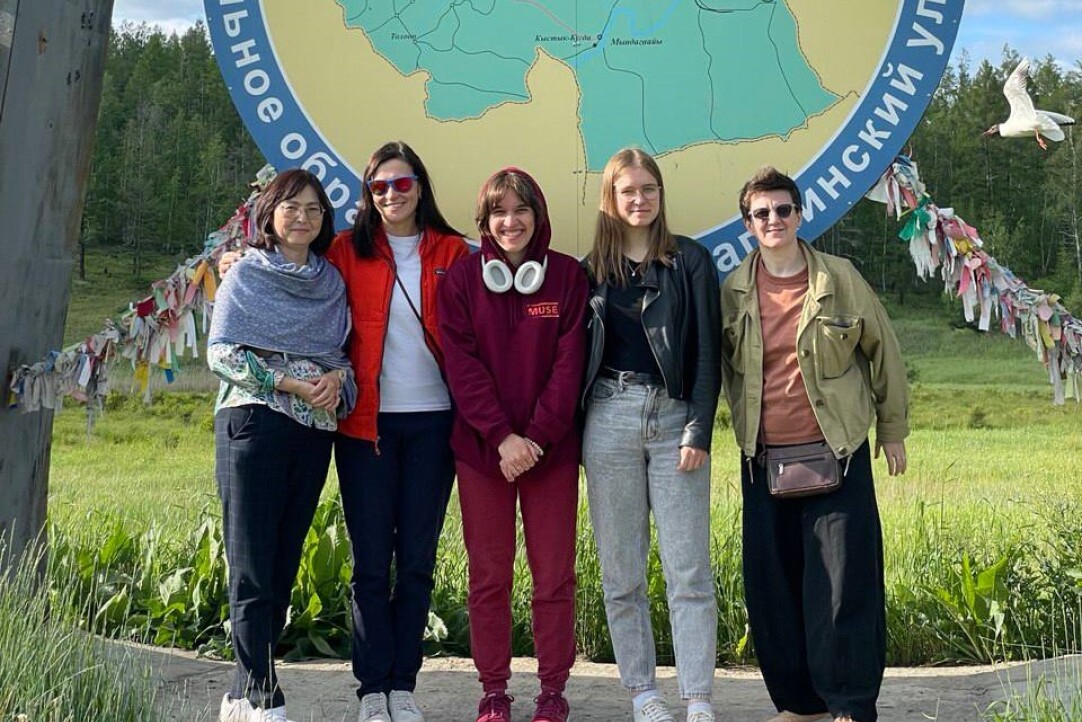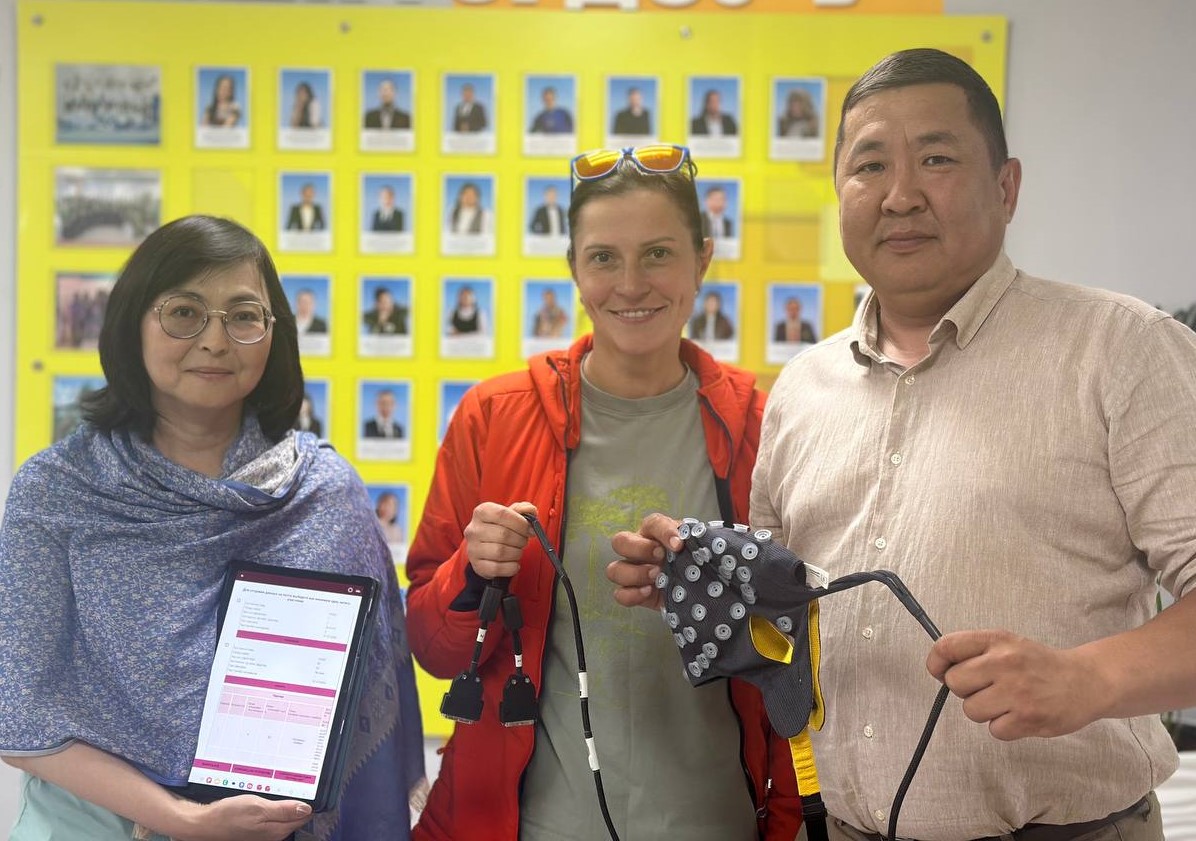Centre for Language and Brain Conducts First Neurolinguistic Field Study of Reading in Yakut

In July, a team from the HSE Centre for Language and Brain, in collaboration with the Centre for the Study, Preservation, and Development of Native Languages of the Academy of Sciences of the Republic of Sakha (Yakutia), conducted the first-ever neurolinguistic expedition to the village of Churapcha to study reading in the Yakut language using electroencephalography (EEG). For the first time, EEG data from 43 adults and behavioural data from 40 children was collected during the two-week expedition.
According to Olga Dragoy, Director of the HSE Centre for Language and Brain and head of the expedition, experimental linguistics worldwide still relies primarily on data from a small number of well-studied languages, mostly from the Indo-European family. As a result, she argues, it is methodologically unsound to draw universal conclusions about the nature of language from such a limited dataset. The objective of the Centre for Language and Brain is to expand both the geographical reach and linguistic diversity of experimental linguistics. Russia, with its multilingual population, offers unique opportunities for this, being home to languages from a wide range of families and groups.
Prior to this expedition, no psychoneurolinguistic research had ever been conducted using material from the Yakut language. The first experiment of this kind was carried out in Churapcha by a team consisting of Olga Dragoy, Olga Tuzhik, and Polina Pilipets from the Centre for Language and Brain and Nadezhda Vasilyeva from the Centre for the Study, Preservation and Development of Native Languages of the Academy of Sciences of the Republic of Sakha (Yakutia).
The choice of the village of Churapcha was intentional, as 99% of the local population speaks Yakut, making the Churapcha district a unique setting for studying native language perception in the context of active Yakut–Russian bilingualism.
During the two-week expedition, the team collected EEG data from 43 adults and behavioural data from 40 children. Adult participants were shown sentences containing incorrect tense coordination. The researchers recorded event-related brain potentials using EEG, enabling them to observe how the brain responds to different types of language errors.
‘The Yakut language distinguishes between an immediate past tense—eg, üleleetim, meaning "I have been working (recently)"—and a distant past tense, as in üleleebitim, meaning "I worked (a while ago)." We are interested in how the brains of native Yakut speakers respond to tense agreement errors between adverbs and verbs,' explains Polina Pilipets, Research Assistant at the HSE Centre for Language and Brain.
For instance, some sentences in the experiment combined the adverb bylyryyn ('a year ago,' indicating distant past) with a verb in the immediate past tense, or paired the adverb subu aghay ('just now,' indicating immediate past) with a verb in the distant past tense.

'According to preliminary surveys of native speakers, sentences that combine a distant-past adverb with a verb in the immediate past tense are perceived as more "incorrect." We expect this distinction to be reflected in the EEG signals—specifically, in the form of larger evoked potential amplitudes in response to the more prominent error,' comments Olga Tuzhik, Research Assistant at the HSE Centre for Language and Brain.
Alongside the EEG experiment, the team conducted behavioural testing with 40 bilingual children who speak both Yakut and Russian. The children completed cognitive tasks in both languages, including the RAVLT and the Trail Making Test in Russian, as well as tasks in Yakut. During the expedition, the researchers, in collaboration with linguists and native speakers, adapted the Russian-language LexiMetr test for assessing children's reading skills in Yakut and collected data in both languages.
'Adapting diagnostic tools for the Yakut language is of great importance, as it enables early diagnosis and support of children with reading difficulties. These tools are essential for both teachers and psychologists,' emphasises Nadezhda Vasilyeva, Leading Researcher at the Centre for the Study, Preservation and Development of Native Languages of the Academy of Sciences of the Republic of Sakha (Yakutia).

The expedition to Churapcha marked the first step toward a systematic study of the Yakut language using neurolinguistic methods. Moving forward, the researchers plan to examine aphasia in Russian–Yakut bilinguals. Similar studies have long been conducted in Russia with respect to the Russian language, but it remains unclear how aphasia manifests in Yakut or what specific language disorder patterns occur in native Yakut speakers. Yakutia offers all the necessary conditions for this research. In particular, the M.E. Nikolaev National Centre of Medicine is equipped with modern neurological and diagnostic facilities and has already expressed its willingness to collaborate.
'I would like to commend the excellent organisation of this expedition. It was the first time we experienced such a high level of collaboration: our colleagues from the Academy of Sciences of the Republic of Sakha (Yakutia) and the administration of the Churapcha district ensured flawless logistics, accommodation, and participant recruitment and motivation. It was truly an inspiring experience,' Olga Dragoy concluded.
See also:
‘We Describe Unwritten Languages’
Chiara Naccarato, Research Fellow at the HSE Linguistic Convergence Laboratory, graduated from university in Italy and came to Russia to study the languages of Dahgestan and the speech patterns of bilingual speakers. She notes the friendly atmosphere of the laboratory and the hospitality of the people of Daghestan.
HSE Neurolinguists Reveal What Makes Apps Effective for Aphasia Rehabilitation
Scientists at the HSE Centre for Language and Brain have identified key factors that increase the effectiveness of mobile and computer-based applications for aphasia rehabilitation. These key factors include automated feedback, a variety of tasks within the application, extended treatment duration, and ongoing interaction between the user and the clinician. The article has been published in NeuroRehabilitation.
'Our Goal Is Not to Determine Which Version Is Correct but to Explore the Variability'
The International Linguistic Convergence Laboratory at the HSE Faculty of Humanities studies the processes of convergence among languages spoken in regions with mixed, multiethnic populations. Research conducted by linguists at HSE University contributes to understanding the history of language development and explores how languages are perceived and used in multilingual environments. George Moroz, head of the laboratory, shares more details in an interview with the HSE News Service.
Scientists Reveal Cognitive Mechanisms Involved in Bipolar Disorder
An international team of researchers including scientists from HSE University has experimentally demonstrated that individuals with bipolar disorder tend to perceive the world as more volatile than it actually is, which often leads them to make irrational decisions. The scientists suggest that their findings could lead to the development of more accurate methods for diagnosing and treating bipolar disorder in the future. The article has been published in Translational Psychiatry.
HSE Linguists Study How Bilinguals Use Phrases with Numerals in Russian
Researchers at HSE University analysed over 4,000 examples of Russian spoken by bilinguals for whom Russian is a second language, collected from seven regions of Russia. They found that most non-standard numeral constructions are influenced not only by the speakers’ native languages but also by how frequently these expressions occur in everyday speech. For example, common phrases like 'two hours' or 'five kilometres’ almost always match the standard literary form, while less familiar expressions—especially those involving the numerals two to four or collective forms like dvoe and troe (used for referring to people)—often differ from the norm. The study has been published in Journal of Bilingualism.
Mathematicians from HSE Campus in Nizhny Novgorod Prove Existence of Robust Chaos in Complex Systems
Researchers from the International Laboratory of Dynamical Systems and Applications at the HSE Campus in Nizhny Novgorod have developed a theory that enables a mathematical proof of robust chaotic dynamics in networks of interacting elements. This research opens up new possibilities for exploring complex dynamical processes in neuroscience, biology, medicine, chemistry, optics, and other fields. The study findings have been accepted for publication in Physical Review Letters, a leading international journal. The findings are available on arXiv.org.
Mathematicians from HSE University–Nizhny Novgorod Solve 57-Year-Old Problem
In 1968, American mathematician Paul Chernoff proposed a theorem that allows for the approximate calculation of operator semigroups, complex but useful mathematical constructions that describe how the states of multiparticle systems change over time. The method is based on a sequence of approximations—steps which make the result increasingly accurate. But until now it was unclear how quickly these steps lead to the result and what exactly influences this speed. This problem has been fully solved for the first time by mathematicians Oleg Galkin and Ivan Remizov from the Nizhny Novgorod campus of HSE University. Their work paves the way for more reliable calculations in various fields of science. The results were published in the Israel Journal of Mathematics (Q1).
From Neural Networks to Stock Markets: Advancing Computer Science Research at HSE University in Nizhny Novgorod
The International Laboratory of Algorithms and Technologies for Network Analysis (LATNA), established in 2011 at HSE University in Nizhny Novgorod, conducts a wide range of fundamental and applied research, including joint projects with large companies: Sberbank, Yandex, and other leaders of the IT industry. The methods developed by the university's researchers not only enrich science, but also make it possible to improve the work of transport companies and conduct medical and genetic research more successfully. HSE News Service discussed work of the laboratory with its head, Professor Valery Kalyagin.
Children with Autism Process Sounds Differently
For the first time, an international team of researchers—including scientists from the HSE Centre for Language and Brain—combined magnetoencephalography and morphometric analysis in a single experiment to study children with Autism Spectrum Disorder (ASD). The study found that children with autism have more difficulty filtering and processing sounds, particularly in the brain region typically responsible for language comprehension. The study has been published in Cerebral Cortex.
When Thoughts Become Movement: How Brain–Computer Interfaces Are Transforming Medicine and Daily Life
At the dawn of the 21st century, humans are increasingly becoming not just observers, but active participants in the technological revolution. Among the breakthroughs with the potential to change the lives of millions, brain–computer interfaces (BCIs)—systems that connect the brain to external devices—hold a special place. These technologies were the focal point of the spring International School ‘A New Generation of Neurointerfaces,’ which took place at HSE University.


